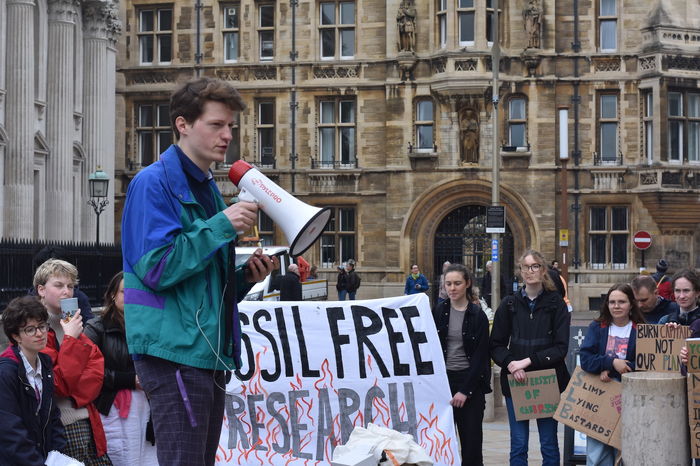University delays kicking oil companies out of research funding
Cambridge is kicking its climate action into the long grass, say campaigners

Cambridge has delayed banning oil company research funding, kicking promised changes to relationships with major polluters further down the road.
After being told to reform the process by which it scrutinises the research funding of fossil fuel companies, the University has subjected this process to multiple delays, which one campaigner has said could mean “a year or more” of inaction.
A student campaign group has said that the University is “ignoring” the consensus of students and staff “in favour of delays and excuses”.
The University has been under pressure since its academic governing body proposed terminating oil company research funding. After blocking the original proposals, Cambridge commissioned an independent inquiry into the University’s research links with the fossil fuel industry.
The report, authored by Nigel Topping, a former UN climate champion for COP26, said that accepting BP and Shell funding poses “high reputational risk” to Cambridge.
The University has accepted the findings of a working group, made up of the University Council, following the Topping report.
But, the University has imposed multiple delays on these recommendations, requiring the “development” of a “Climate Research Strategy”, and the appointment of a new pro-vice-chancellor.
Even the schedule of this report was pushed back multiple times, campaigners have said. Sam Hutton, Chair of the SU’s Ethical Affairs campaign, told Varsity that the report “took over a year to complete, breaking several deadlines set by the council”.
The focus of the report’s recommendations is the process by which the University reviews and accepts research funding, which the Topping report demanded be “clarified”.
This system, used to scrutinise the ethics of associating with fossil fuel companies, which has been in place since 2018, was found to “lack clarity and transparency”.
The board which reviews funding, the Committee on Benefactions and External and Legal Affairs (CBELA), must rely on “third-party analysis” and external definitions of the term “fossil fuel company,” Topping found.
The working group findings, however, now adopted by the University, merely “invite” CBELA to “review its processes”.
This review will be carried out in “reference [...] to the priorities set out in the Climate Research Strategy” (CRS), which is yet to be created by the University.
The CRS itself depends on the appointment of a new pro-vice-chancellor for sustainability, who is yet to be chosen. The appointment board for this new role has not yet been created.
These delays have been imposed in the same report that claims that the University has “undoubted prowess in certain areas of climate and sustainability research”.
Sam Hutton told Varsity that the University is “shuttling” these recommendations “around as many committees and boards as possible”.
“They’ve decided to implement a new PVC for sustainability, whose appointment will delay this even longer. It is hard to avoid the explanation that they just want to keep taking the money for as long as possible,” Hutton said.
Following this appointment, the review of the scrutiny board will take place “behind closed doors”, with “little oversight and no guarantee that they will stick to the objective metrics” offered by the Topping report.
“Once again, the University is kicking this into the long grass, hoping that once they bury it in their bureaucracy, we’ll forget about it. Students know that we can’t afford to wait years for this, and we’re just waiting for the university to catch up,” Hutton said.
Cambridge Climate Justice (CCJ), a student campaign group, said: “This non-committal report from the working group is a disappointing and unfortunately expected response from the university, that kicks the can down the road, again.”
“The university is relying on bureaucracy to delay the will of staff and students, [...] this response will seem like nothing less than a bare-faced attempt to escape culpability for the harm they are causing,” CCJ said.
Fergus Kirman, SU President and member of University Council, told Varsity: “It’s already been 16 months since the initial Grace about fossil fuel funding was proposed, and I’m acutely aware of frustration that action has not been swifter.”
While praising the University’s intended actions, Kirman said that Cambridge “must move swiftly to take those actions now, and not risk delaying them further”.
Along with the delays in reforming its scrutiny of research funding, the University has considerably slowed down its plans for discussions with students and staff about its climate policy.
The University pledged to roll out “further consultation” after recieving the Topping report, setting a deadline of the end of December 2023. When accepting the Working Group’s recommendations this month, however, the University conceded that “community engagement will start this term”.
A University spokesperson said: “Work is already underway on the Topping Study’s recommendations. The proposed Pro-Vice-Chancellor with responsibility for sustainability will play a key part in driving progress on the University’s sustainability ambitions.”
 Comment / Plastic pubs: the problem with Cambridge alehouses 5 January 2026
Comment / Plastic pubs: the problem with Cambridge alehouses 5 January 2026 News / Cambridge businesses concerned infrastructure delays will hurt growth5 January 2026
News / Cambridge businesses concerned infrastructure delays will hurt growth5 January 2026 News / Cambridge academics stand out in King’s 2026 Honours List2 January 2026
News / Cambridge academics stand out in King’s 2026 Honours List2 January 2026 News / AstraZeneca sues for £32 million over faulty construction at Cambridge Campus31 December 2025
News / AstraZeneca sues for £32 million over faulty construction at Cambridge Campus31 December 2025 Interviews / You don’t need to peak at Cambridge, says Robin Harding31 December 2025
Interviews / You don’t need to peak at Cambridge, says Robin Harding31 December 2025










